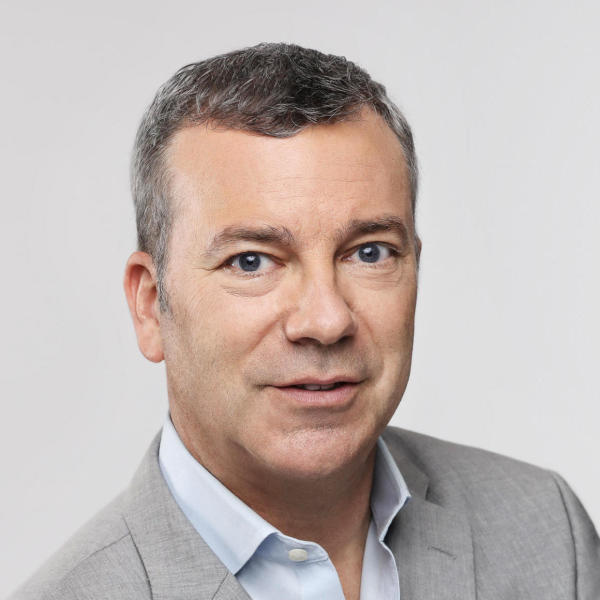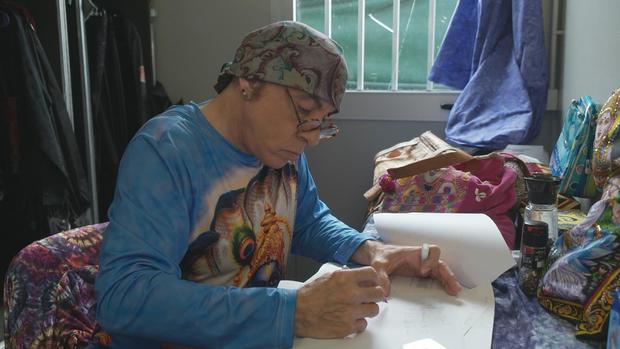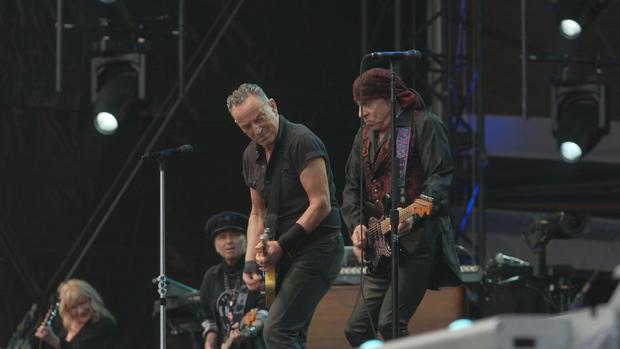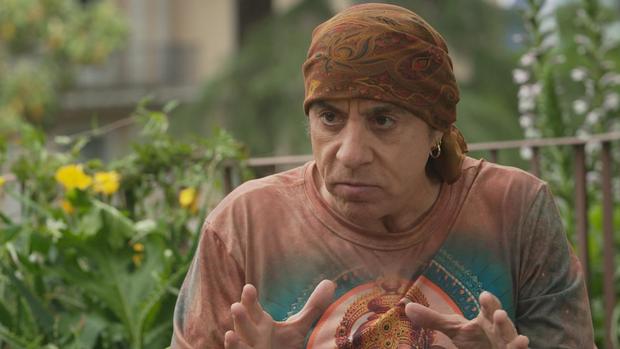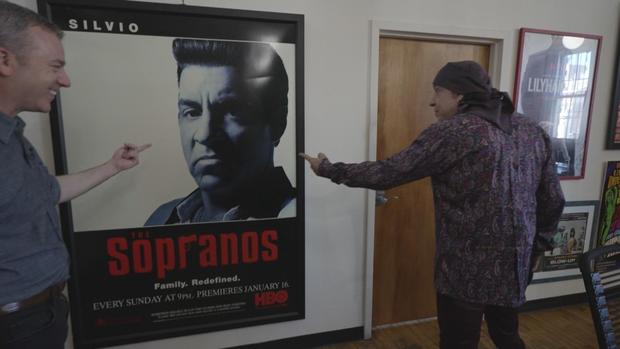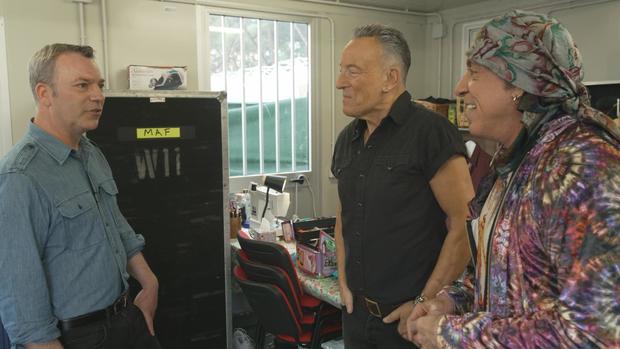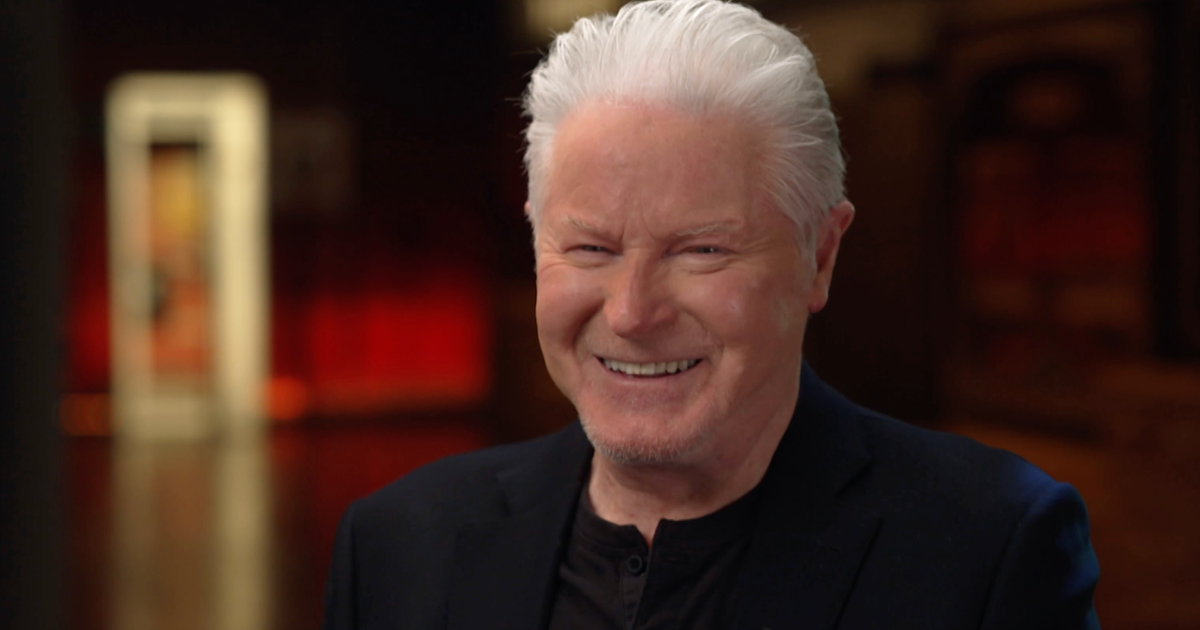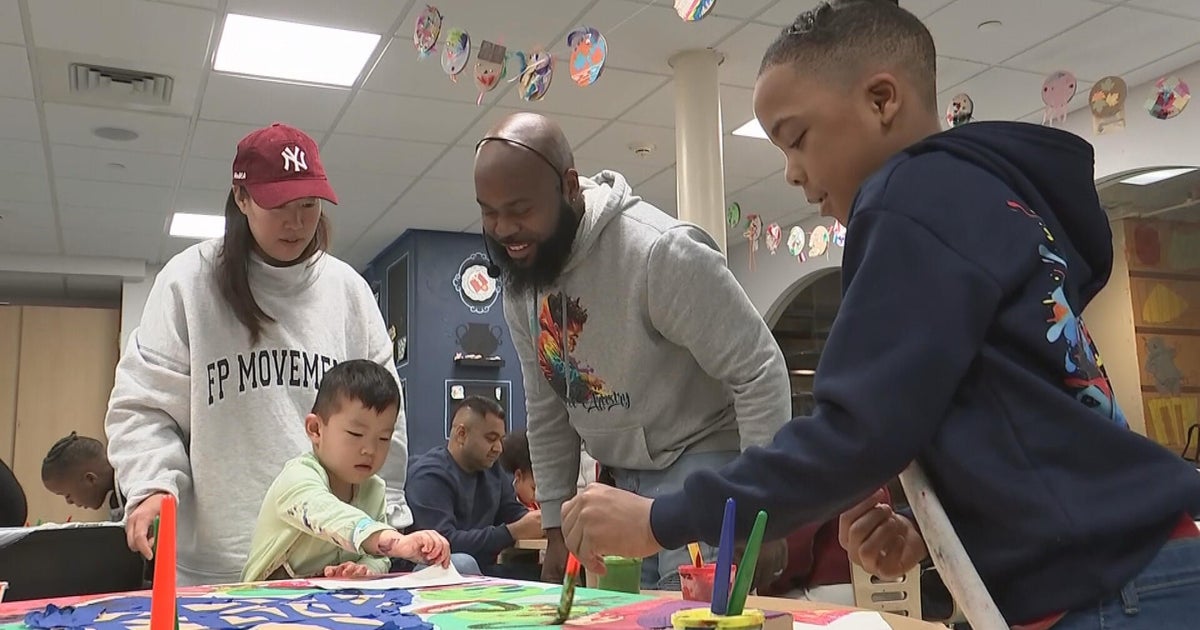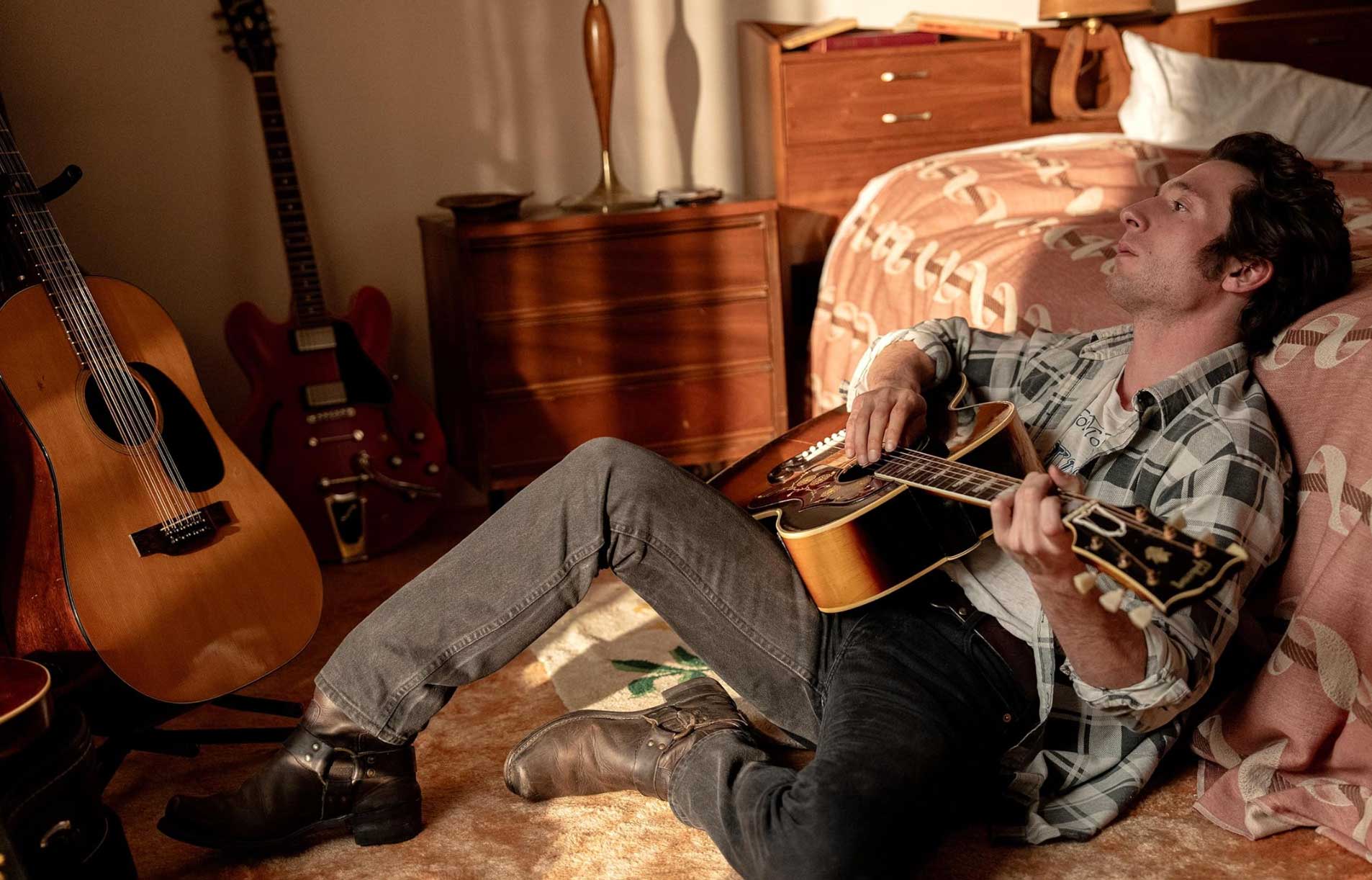Steven Van Zandt talks Bruce Springsteen, "The Sopranos" and his quest to save rock 'n' roll
This is an updated version of a story first published on Nov. 19, 2023. The original video can be viewed here.
Steven Van Zandt embodies both a frustration and a beauty of the arts. There are no org charts, no official titles, no one way to do the job. He has discovered that it's easier to be this creative furnace, this volcano of artistic output when you are not the focus. So, as we told you in November, the longtime guitarist and musical director for Bruce Springsteen and the E Street Band was also an underboss of a different kind, acting in one of history's most influential television shows, "The Sopranos." That is, when he wasn't writing scripts and arranging music, all while trying to preserve rock 'n' roll. The highway may be jammed with broken heroes, yet Little Steven refuses to pick a lane.
Late on a Sunday afternoon last summer, Stevie Van Zandt was midway through a burst of furious creativity. Tending to his latest screenplay, he had an idea he had to commit to the page.
Where was this quaint writer's retreat? In his backstage dressing room. At a concert. In Rome, mere minutes before Van Zandt put his pen and pad away and then went on stage to perform at Circus Maximus, the ancient chariot arena, as a critical member of one of the most successful rock 'n' roll acts of all-time.
Jon Wertheim: You said we had to come see you guys perform in Rome. Of all the cities, all the gin joints, why Rome?
Steven Van Zandt: The fans here are just so much fun. You see everybody singing every single word of every single song when they don't particularly speak English, right, you know, which is impressive.
Jon Wertheim: That's a validation.
Steven Van Zandt: Well, it's a validation. It's a show of the power of what we do.
Swaddled in his trademark bandana, and wrapped in complexity, Little Steven, now 73, remains a true American original. The ultimate wingman…
Steven Van Zandt: I'm not crazy about the spotlight, I could have been, and maybe I should have been, okay? 'Cause, again, I-- you realize that has big advantages. But, naturally, I just wasn't into it. I, you know, I'd rather be standing next to the guy. Let him be in the spotlight, let him take the heat. Cause I like to blend in actually, you know.
Jon Wertheim: Yeah, I can tell by the modest measured outfit.
Steven Van Zandt: I gave up tryin' to analyze it years ago. But I prefer to be an observer rather than the observed.
Jon Wertheim: Can I break it to you?
Steven Van Zandt: Do I need to lie down on the couch for this?
One thing he's not questioning: his place in the band.
Steven Van Zandt: You know, people always say, you know, "Aren't you worried about, being replaced? I'm like, "I, no. I can't be replaced. How many best friends do you have for 50 years, you know?"
The best friend he references, of course, is Springsteen…they met as teenagers in 1960s Jersey, misfits seduced by rock 'n' roll. To quote Little Steven: 'the Beatles revealed this new world to us, the Rolling Stones invited us in.' They formed a band, anchored in the boardwalk town of Asbury Park. Given that Van Zandt had a monthly overhead of $150 in rent, the going was good. More important, the band learned how to play live, how to marry musicianship with showmanship….
Steven Van Zandt: The fact that we were in bars, you know, makin' our bones, you know, what, seven years before we got into the music business, right?
Jon Wertheim: You get into this game because this speaks to you. What's it brought you that you didn't expect?
Steven Van Zandt: Other than everything? You know what I mean, it was just everything. It saved my life. I mean, I didn't have any path forward. And so it brings you acceptance. You're part of something. And man, it just came along right at the right time. You're makin' a living playing rock 'n' roll, man. That was the miracle.
Van Zandt, who doesn't read or write music, brought his guitar chops, and his musical ear. arranging the iconic horns on "Tenth Avenue Freeze-Out" and polishing Springsteen's guitar lick on "Born to Run."
Jon Wertheim: How much credit do you take? How much credit should you take for the success of this band?
Steven Van Zandt: I understood certain things earlier than everybody else. If you listen to "Darkness on the Edge of Town" and listen to "River," the difference is me you know…I'm not, I'm never, I'm not ever gonna take more credit than the rest of this band. So, I just was kinda helping shape things, and tryin' to realize Bruce's vision. It's his vision. I try to make bad things good, good things great, and great things better, you know?
Yet, after an argument over creative input, Van Zandt left the band in 1984 and was conspicuously absent on tour for Springsteen's most commercially successful album. He had married actress Maureen Santoro and started writing songs for his own band, Little Steven and the Disciples of Soul.
And he turned his attention to political activism, most notably to apartheid in South Africa.
Steven Van Zandt: Twenty six million Black people could not vote, they could not even have-- you know, a cup of tea with a white person without permission. It's terrible.
In 1985 Van Zandt wrote and co-produced the protest song "Sun City," which cast the resort-town three hours outside Johannesburg as a symbol of the moral failure of apartheid. Van Zandt didn't just get his colleagues to sing on an album; he got them to commit to a Sun City boycott.
Jon Wertheim: You saw through that?
Steven Van Zandt: Yeah. So, we used that as the example. And we exposed that whole fraudulent scheme.
Jon Wertheim: "Ain't gonna play 'Sun City'."
Steven Van Zandt: Yeah.
In the late 90s, he and Springsteen reconciled. and when the Boss asked his buddy to rejoin the E Street band, well, this gun was for hire. But there was a hitch. Van Zandt had already committed to a new TV show on HBO.
The creator, David Chase had seen Van Zandt at the Rock & Roll Hall of Fame and made him an offer he couldn't refuse.
Steven Van Zandt: He calls and says, "You know, you wanna be in my new TV show?" And I said, "Wow, that's really nice, David. I really appreciate that. But no, not really," you know? He said, "What do you mean, no?" I'm like, "I'm not an actor, you know? Isn't that a problem?"
Van Zandt says Chase wanted him to play the lead.
Steven Van Zandt: He goes to HBO, HBO says, "Are you outta your mind, you know? You gonna depend on a guy who never acted before?"
Jon Wertheim: "Nice guitar playing and all, but--"
Steven Van Zandt: Yeah, "I mean, what are you, nuts?"
"The Sopranos" would elevate television. While the lead would go to James Gandolfini, Van Zandt would scene-steal as Silvio Dante, manager of the Bada Bing Club.
Steven Van Zandt: I knew if I could create the guy from the outside in, if I could see him in the mirror, I felt I could be him. And I was a little bit of a mob aficionado, you know what I mean? You know, I played at Flamingo Hotel for Christ's sake, you know? Come on, come on, you know? I mean, who has better credibility than that, you know.
The guy who played Tony Soprano's right hand man? He had more than a passing familiarity with the part.
Jon Wertheim: I don't wanna liken Bruce Springsteen to a mob boss, but you'd had that experience, you'd done that drill, you knew what it was like.
Steven Van Zandt: I know those dynamics, okay? I know bein' the only guy who's not afraid to tell the boss the truth. That's the job. That's the gig. If you're the guy's best friend, or the consigliere, or the underboss, you know, somebody has to be the one to occasionally bring bad news.
What was an adjustment: the passive-aggressiveness of the acting stage.
Steven Van Zandt: Because now it's like, "Who's got more lines--"
Jon Wertheim: Really?
Steven Van Zandt: "Who's gonna be in front of the camera at the right time?" So, I'm sensing all of this kinda weird…ya know…little bit weird…I'm not used to this kinda…
Jon Wertheim: This tension?
Steven Van Zandt: Yeah, and I decided then, I'm gonna turn this show into a rock and roll band, you know? Before I'm done, okay, this show is gonna be a band. It's all for one and one for all right?
An original "Sopranos" poster is one of countless music and film relics adorning Van Zandt's studio in Greenwich Village. When the "Sopranos" journey ended after eight years, Van Zandt being Van Zandt, embarked on new projects: he started his memoir. And he co-wrote and starred in "Lilyhammer," a mob show based in Norway that would become the first original series in the history of a streaming service called….Netflix.
But wait there's more. Concerned about the decline in rock venues and album sales, he launched a weekly radio program, Little Steven's Underground Garage.
Jon Wertheim: You wouldn't mind if you guys were supplanted a little bit by a new wave of E Street Bands?
Steven Van Zandt: I would love it. I mean, that's what my entire radio show is about.
He also somehow found the bandwidth to launch TeachRock, a free K through 12 curriculum that uses rock 'n' roll to sneak in teaching all the other stuff.
Steven Van Zandt: We say tell us what you're listening to. "Well, I'm listening to Beyonce." Oh, well, you know where Beyonce comes from? She comes from a woman named Aretha Franklin. And Aretha Franklin, she comes from a place called Detroit, you know? We talk about Detroit. And we talk about-- she comes from the gospel church. We talk about that. She was involved in civil rights. Then we talk about that, you know? And they're listening and they're paying attention. Why? Because we're on their turf.
Jon Wertheim: And yet, we always hear about how art and music programs are getting cut in public schools.
Steven Van Zandt: Yes.
Jon Wertheim: Why's that?
Steven Van Zandt: Because, people don't understand we're the only country in the world that thinks art is a luxury. Everybody else in the world understands that art is an essential part of the quality of life.
The current culture of the arts, the shifting state of play in music, makes him all the more grateful that a couple of Jersey nonconformists timed it right, caught some breaks, and became rock 'n' roll titans.
Jon Wertheim: How do you even begin to start describing Steven Van Zandt?
Bruce Springsteen: I don't know if I can do that-- except all I can say is I met him when he was 16. Steve is the consigliere of the E Street Band. If I have questions pertaining a direction for the band, or issues with the band, or something like the set list, I'm not sure what we're gonna play that night, or what we should start with, or if he has second doubts about something, he always comes to me. So ,he's been essential to me since, I don't know, since he walked into the studio during the Born to Run sessions, and fixed the horns, and my guitar parts. And we've been doin' it together for a long time. And that's a wonderful thing. I mean, how many people have their best friend at their side 50 some years later.
Bruce Springsteen: There you are, kid.
Steven Van Zandt: What are you guys talkin' about? What are you talkin' about?
Bruce Springsteen: We like the same music. We like the same clothes.
Jon Wertheim: You guys meet as teenagers, you're these Jersey outcasts. And here we are more than 50 years later and you're goin' out to play Circus Maximus in Rome.
Steven Van Zandt: That's somethin'.
Bruce Springsteen: You can't put it together. It's just one of those things that happens.
Jon Wertheim: How do you make sense of that, seriously?
Steven Van Zandt: Well, in a way, it makes sense, because I think as we mentioned, we couldn't do anything else. So we were gonna… we were destined to do this.
Bruce Springsteen: And we did nothing else. So that has a lot to do with it too. All we did was music, music, music, music, play, play, play, play.
That, we and the rest of the crowd experienced for ourselves.
Still rocking out in his 70s, trying to save radio, trying to save rock, writing screenplays. If Steven Van Zandt is accused of being an artistic dreamer, without apology, he'll plead guilty.
Jon Wertheim: This gonna sound harsh. Is this the sonic version of Don Quixote?
Steven Van Zandt: Yeah, that's pretty much my life story. But occasionally you knock down a windmill or two. (laughter).
Produced by Michael Karzis. Associate producer, Kara Vaccaro. Broadcast associate, Elizabeth Germino. Edited by Daniel J. Glucksman.
